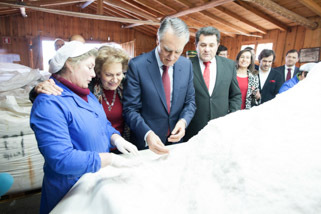
I salute with deep friendship His Majesty King Dom Juan Carlos and His Excellency the President of the Republic of Italy, Mister Giorgio Napolitano.
This COTEC Europa Meeting was an opportunity for a joint reflection over the challenges of the deepening of technological innovation in the productive fabric of our economies.
Innovation is the factor that most directly influences the different dimensions of productivity and, consequently, economic development itself.
In spite of all the efforts in the promotion of policies to stimulate innovation, a significant divergence is still apparent in the productivity of the Southern economies versus those of the remaining countries in the European Union, a phenomenon that has anyway been emphasized since the 2008 economic crisis.
The slowdown in the capacity to generate added value per unit of work is the most evident symptom of the weaknesses and of the insufficient systems of entrepreneurial innovation in our economies.
It is evident nowadays that economic growth cannot just depend anymore on mere cost reduction. Advances in productivity and competitiveness based on quality and technological innovation are decisive.
Productivity and innovation are determined by the same factors and are the result of an identical realty: qualified and motivated workers, skilled management, technological knowledge, research and, no less important, the stimulus of open and transparent competition.
The reasons for divergence that, in the matter of competitiveness, our economies show versus the remainder of Europe are well known. First of all, our productive structure, almost exclusively based upon Small and Medium Sized Enterprises, has great difficulty in benefiting from the flow of knowledge and technology produced by innovation systems.
The sectors of medium and high technology, those that generate higher levels of added value, also have a relatively limited expression in our economies.
A measure of technological deficit in Southern economies arises from the difference in the weight of R&D expenditure in our enterprises, approximately 20% below the average in the European Union.
In the light of an unfavourable entrepreneurial environment, the correction of this weakness faces increased difficulties, especially in the short term.
Public policies for the support of innovation have an indispensable role in providing encouragement and in the preservation of what has been gained throughout the last decade.
Ladies and Gentlemen,
The COTEC Europa Meetings have debated at great length the changes that must be introduced in the European innovation development policies that aim to boost the technological capabilities of Small and Medium Sized Enterprises.
The relevance of the European science and technology policies in raising the quality of the scientific institutions in our countries is unarguable.
However, capacity for innovation has progressed at a rate distant from the needs of our countries’ industrial fabric and, especially, in the generality of the Small and Medium Sized Enterprises.
A European large spectrum industrial technological innovation policy will have to place its focus on the productivity of Small and Medium Sized Enterprises, which represent 78% of employment in the industrial sectors and are responsible for a significant slice of economic growth.
Small and Medium Sized Enterprises are an essential vehicle to convert the capital assets of European technological knowledge in greater innovation, greater productivity, greater growth in employment and, for all these reasons must more than ever lie in the centre of national and community policies.
The stimulus for the increase in entrepreneurial productivity must in effect be assumed as a new mission of community policy and of its national projections.
Since productivity has a crucial role in the competitiveness of our economies, the innovatory capability of Member States must become, in itself, an objective of European cohesion.
I recall that the President of the European Commission made himself available to bring about an interaction in this regard with the COTEC organizations.
Ladies and Gentlemen,
Almost a decade ago, the three COTEC organizations decided to unite their efforts in the project that we named COTEC Europa.
They did so because there was a rampant need to stimulate, jointly, the innovatory capacity of the three countries, sharing experience and knowledge, disseminating best practises, and carrying out projects of mutual interest.
The founding objectives of our collaboration are still valid and, probably more than ever, opportune. It is especially important to continue asserting a shared view of the specificities of the Southern economies, whose societies aggregate more than 54 million workers in 7 million companies, within the framework of the “European Area of research, development and innovation”.
Our countries are going through very demanding times. We face financial, economic and social challenges that place on trial the solidity of our economies and which require full and urgent answers, to be carried out in a particularly difficult context.
To increase productivity, to achieve a robust and sustained economic growth and, at the same time, create qualified employment, are more than priority objectives, they are vital targets.
The reflection held here today on the challenges of technological innovation relays to our collective responsibilities and common objectives.
In spite of the persisting crises, entrepreneurial innovation is the most powerful of sparks.
It is our duty to work with confidence and in coordination in order to overcome the challenges that we are facing.
Thank you very much.
© 2006-2016 Presidency of the Portuguese Republic
You have gained access to the records of the Official Site of the Presidency of the Republic from 9 March 2006 to 9 March 2016.
The contents available here were entered in the site during the 10 year period covering the two mandates of President of the Republic Aníbal Cavaco Silva.